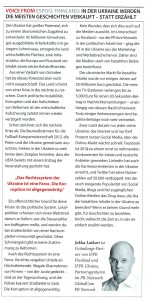With a population of about 45 million, a well-educated, low-wage workforce, rich agricultural land, infrastructure linking to Europe and Russia, and vast mineral and potential energy resources, Ukraine has all the potential to become one of the economic bellwethers.
For reason or another potential has not yet become reality. The country of resources seems to float from a crisis to another – most recently 2009 and 2010. Political instability, corruption and slow economic reform have again and again postponed the economic growth.
And the next crisis is already on the horizon. The promised buildings and improvements for European Football Championships 2012, divided between Poland and Ukraine, are far behind from the original schedule.
One obvious reason behind these crises is the political system. Local politicians, protected by almost total immunity from prosecution, seem to compete who can milk most from the national taxpayers. Do to this competition there is no real will to realize any improvements without a personal kickback.
Also the legal system is a farce. Courts are awarding judgements to the highest bidder. Corporate raidering coupled with support from the legal system has become virtually a daily occurrence. Police claims the fines in cash – speeding has its price, drunk driving an other. Corruption has reached endemic levels.
Paid-for content
No wonder that all of this reflects to the media as well. Unlike neighbouring Russia, where the PR has its roots in political PR, the Ukraine’s PR industry has developed from advertising and marketing, making the country’s media highly influenced by paid-for content.
Few years ago paid-for articles was estimated as a 50 million euro industry. Most television channels charge up to 5000 Euro for a 30-second clip in the national news – no matter the news value.
Despite recent improvements, paid-for articles have remained widespread, especially for political purposes. They are also a common practise among the multinational corporations, who tend to think that “this is the way to do business in Ukraine”.
Online-PR
Only a quarter of Ukrainians use the internet and only 5% of them use social media, but the market is growing rapidly. During 2010 Facebook has become a serious rival to the local and Russian sites, LinkedIn has become increasingly popular among career oriented Ukrainians and Twitter had 50 000 users in the end of 2010 – more the double compared a year before.
Even though Ukrainian digital audiences are still relatively small, they are the most active part of the population in terms of political, economical and social issues.
Will this rapidly growing popularity of social media, blogs and free content in internet, may finally end Ukraine’s paid-for editorial era? When there is no reason to sell the story anymore, maybe it will be the time to just tell it.
—-
Jukka Laikari is the founding partner of IFPR Finland and IFPR Ukraine, members of GlobalCom PR-Network.

